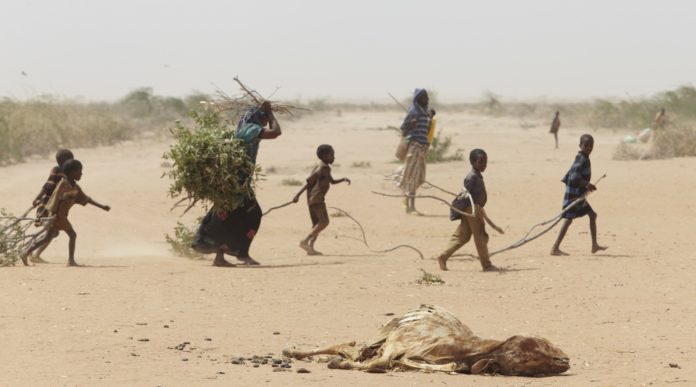
If countries fail to develop and sustain policies that mitigate the impacts of climate change and provide a safety net for the world’s poor, global warming will drive an additional 100 million people into poverty by 2030, a new World Bank report warns.
The report, titled “Shock Waves: Managing the Impacts of Climate Change on Poverty,” describes climate change as a “significant obstacle” to the eradication of global poverty. Poor people are already more vulnerable to climate-related “shocks” such as flooding, drought, crop failure, spikes in food prices, waterborne disease and the long list of extreme weather patterns that scientists have said will increase due to climate change, the report says, and a lack of effective anti-poverty programs threatens to magnify these vulnerabilities and wipe out hard-won gains in the fight against poverty.
“This report sends a clear message that ending poverty will not be possible unless we take strong action to reduce the threat of climate change on poor people and dramatically reduce harmful emissions,” World Bank Group President Jim Yong Kim said in a press release.
The World Bank projected last month that the number of people in poverty would drop to 702 million this year, or 9.6 percent of the world’s population. That’s down from the 902 million people, or 12.8 percent of the population, who were living in poverty in 2012. The expected decline brings the world “closer to the historic goal of ending poverty by 2030,” the World Bank said at the time.
But climate change now threatens that goal, the report warns.
“Climate change hits the poorest the hardest, and our challenge now is to protect tens of millions of people from falling into extreme poverty because of a changing climate,” Yong Kim said.
The report relies on the most recent modeling results that show how climate change affects agricultural productivity and food prices, natural hazards such as heat waves, floods and drought, and climate-sensitive diseases. Those results were combined with findings from household surveys in 92 countries that describe demographics and sources of income.
Impacts on agriculture, the report says, will be the main driver of greater poverty caused by climate change. According to modeling analyzed by the study, climate change could cause global crop losses of as much as 5 percent by 2030 and 30 percent by 2080.
Extreme weather changes could lead to a significant decline in crops, which would in turn spike agricultural prices and jeopardize food security in regions like sub-Saharan Africa and South Asia. In Africa, prices could shoot up by as much as 12 percent by 2030 and 70 percent by 2080, the report said.
Health effects will be the second-strongest driver of poverty. The number of people with malaria could reach 5 percent, or 150 million people, by 2030, the report says, and other vector-borne diseases like chikungunya, Dengue fever, and West Nile virus are expected to vastly expand their geographic reach. Meanwhile, flooding and restricted access to clean drinking water sources are projected to increase the incidence and mortality of waterborne diseases, while air pollution is contributing to rises in respiratory illnesses, cardiovascular disease, cancers, and premature death.
As the World Bank explains in the report, “Diseases—and more generally poor health—increase poverty for several reasons. Health expenditures can absorb a large share of a household’s income. Diseases reduce productivity because of missed work and school days, caregiving responsibilities, or reduced productivity. And in the long term, they can impair children’s development and reduce their ability to learn, which can affect earnings.”
However, “[t]he future is not set in stone,” said Stephane Hallegatte, a senior economist at the World Bank who led the team that prepared the report. “We have a window of opportunity to achieve our poverty objectives in the face of climate change, provided we make wise policy choices now.”
To forestall the worst of the consequences, efforts to tackle climate change must incorporate strategies to eradicate poverty, the report said. Countries should reduce their vulnerability through targeted investments in flood defenses, early-warning systems, and climate-resistant crops, as well as universal healthcare and social programs to reduce inequality and improve socioeconomic conditions. According to the report, these social safety nets are essential for the sustainable eradication of poverty.
The report also emphasized that programs to lessen the impacts of climate change must be careful not to create new vulnerabilities. Without proper planning, the authors warned, climate mitigation efforts could undo decades of progress in lifting vulnerable people out of poverty. For example, environmental taxes, designed to reduce emissions, can raise the cost of fuel and food, which hit poor people hardest.
“Ending poverty and stabilizing climate change will be unprecedented global achievements. But neither can be attained without the other: they need to be designed and implemented as an integrated strategy,” the report concludes.
The World Bank’s findings come just days after the United Nations Environment Programme (UNEP) released an alarming new report showing that current global pledges to reduce emissions are “far from enough” to avoid the catastrophic effects of climate change. According to the analysis, even if all countries keep their pledges — also known as Intended Nationally Determined Contributions (INDCs) — the reduction in greenhouse gas emissions would not be nearly sufficient to stabilize warming below dangerous levels by the end of the century.


